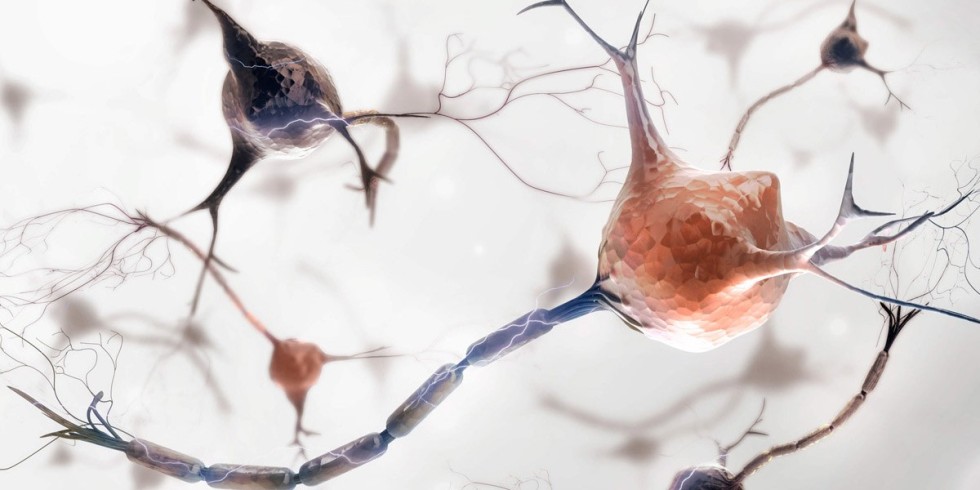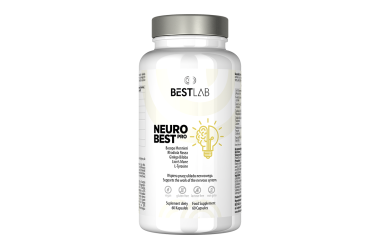Nervous tissue is one of the most essential structures responsible for controlling our bodies. Its importance in daily functioning is so great that there are even specialised dietary modifications and supplementation to support this system.
Nervous tissue is one of the most essential structures responsible for controlling our bodies. Its importance in daily functioning is so great that there are even specialised dietary modifications and supplementation to support this system.
The nervous system, broadly speaking, can be divided into two components: the somatic nervous system, which receives stimuli from the environment and acts according to our will, and the autonomic nervous system, which operates partially independently of our will and also receives stimuli from the environment. This group of components is called the peripheral nervous system. Diet and lifestyle strongly influence the condition of nervous tissue and its functioning. It’s worth taking a closer look at how certain lifestyle modifications can promote nervous system regeneration.
Lifestyle and its impact on the nervous system
The quality of one's lifestyle strongly influences the condition of the nervous system. Its main task is to detect various types of environmental stimuli and adequately transmit this information throughout the body.
Unfortunately, modern times are not conducive to maintaining a healthy and high-quality lifestyle. Constantly living on the run and juggling numerous responsibilities puts our nervous system under significant strain and, in extreme cases, can even lead to its deterioration.
The first factor affecting the nervous system's health is inadequate regeneration. By regeneration, we primarily mean the appropriate amount and quality of sleep, approximately 7-9 hours. Failure to achieve this goal results in elevated cortisol levels, which impact the quality of neural connections. Lack of rest after work has a similar impact.
Another factor negatively affecting the quality of nerve connections is a highly processed diet rich in ready-made products and fast food. These products contain a high amount of pro-inflammatory trans fatty acids, which worsen gastrointestinal comfort and increase the risk of developing lifestyle-related diseases.
Finally, consider the poor quality of food, which often fails to meet the body's essential nutritional needs. Due to a lack of time, most people are unable to balance their diet, which, combined with the quality of food, leads to many nutritional deficiencies.
The final primary factor negatively affecting the nervous system's health is excessive physical activity. This mainly applies to physically active people. Intense training sessions, especially those involving heavy lifting, consume large amounts of glucose, which is a key fuel for nervous tissue. This strains the nervous system, and the exercising individual needs to dedicate more days to recovery before the next workout.
How can we improve our lifestyle and regenerate the nervous system?
When it comes to lifestyle, we must also remember the importance of certain diseases closely related to inflammation of the nervous system. However, these conditions require a proper diagnostic approach from a specialist and further specialised treatment.
That said, it is still possible to effectively influence and manage the quality of one’s lifestyle. Much depends on one’s availability of time and willingness to make changes that, in the long run, will strengthen the body’s resistance to various inflammatory factors. To improve your nervous system's health, it's worth investing some time in sleep hygiene. The growth hormones produced during sleep are key factors in regenerating body tissues, including nervous tissue. In terms of sleep hygiene, this mainly involves properly airing out the bedroom, changing the bed linens, and possibly eliminating stimulating factors such as blue light, car noises, and other environmental elements that may cause distractions. That’s when we can talk about uninterrupted sleep, which provides the nervous system with adequate restorative factors.
Adequate sleep provides the nervous system with:
- vitamins B,
- vitamins A, D, and E,
- antioxidants,
- minerals,
- and adaptogens.
It's also essential to properly regulate the intensity of your physical activity. Let’s be realistic about our capabilities and keep in mind that overly frequent training sessions and lifting heavy loads can negatively affect the nervous system’s efficiency.
What happens to the nervous system during inflammation?
When inflammation occurs, the nervous system is among the tissues most affected by an unhealthy lifestyle. At that point, excessive cortisol expression occurs, which, in high amounts, causes damage throughout the body.
Pro-inflammatory factors such as excessive levels of cortisol and inflammatory cytokines worsen the quality of nerve connections, making it difficult to concentrate, complete tasks effectively, and causing persistent fatigue. High levels of stress also disrupt the proper synthesis of neurotransmitters in our gut, which negatively affects the quality of signals sent from the environment to the brain. This causes what is commonly known as "brain fog". It worsens mood and overall quality of life. We also lose the ability to focus and develop cognitive functions. In extreme cases, this can lead to the development of neurodegenerative diseases that cause neuron damage, which, unfortunately, is permanent and very dangerous to life.
Can supplementation help regenerate the nervous system?
Nowadays, people are increasingly seeking information about alternative and natural methods to support their bodies. As a result, there is growing interest in the supplement market, which offers products proven to help manage various inflammatory conditions. The same applies to nervous system regeneration, where certain dietary ingredients, at higher concentrations, promote the health and protection of nervous tissue. The main factor that distinguishes a supplement from regular food in this case is the dosage of a given substance, which, at higher concentrations, can provide a beneficial health effect on the host’s body.
Among the substances recommended for those looking to support nervous system regeneration are:
- Omega-3 fatty acids,
- vitamins B,
- antioxidants and certain minerals,
- and adaptogen herbs.
Omega-3 fatty acids are a strengthening supplement worth considering as part of your regimen. Omega-3 fatty acids help reduce inflammation and levels of pro-inflammatory cytokines. They improve the structure of nervous tissue and protect neurons from the harmful effects of various environmental factors.
One of the most essential elements for nervous system regeneration is B vitamins. They serve as cofactors for various enzymatic reactions involved in energy production during cellular respiration. This process is ESSENTIAL for the fuelling and functioning of the nervous system. A large number of mitochondria (organelles responsible for cellular respiration) are concentrated in nervous tissue, underscoring the crucial role of B vitamins in the daily functioning of the nervous system. Many of these vitamins also influence the synthesis of key neurotransmitters, responsible for the efficient transmission of nerve signals throughout the body. A large portion of B vitamins are also antioxidants, compounds that help scavenge free radicals in the body and reduce inflammation.
Let's not forget about adaptogens—herbs with a high potential to help the body adapt to environmental stressors. Thanks to them, the human body can cope more effectively with stressful situations, and their impact on the regulation of the hormonal and nervous systems is scientifically proven. Adaptogens reduce excessive cortisol levels and promote the formation of new neural connections. This occurs through the stimulation of neurotrophic factors such as BDNF (brain-derived neurotrophic factor) and NGF (nerve growth factor), which play key roles in supporting neuronal growth and survival. They influence the development of neural networks and the formation of new connections between neurons, which not only support the regeneration of the nervous system and reduce inflammation in nervous tissue but also enhance cognitive abilities.
Among the recommended adaptogens and other ingredients that positively impact nervous system health, supplementation with the following is advised:
- Vital Mushrooms (Cordyceps, Lion's Mane, and others),
- Green Tea Leaf Extract with L-Theanine,
- Shilajit Mumio,
- and Bacopa Monnieri Extract.
NeuroBest, a chance to regenerate the nervous system
The ingredients mentioned above are key compounds that positively impact the prevention and regeneration of the nervous system. Regular use of these compounds will contribute to improved well-being, better physical condition, and more efficient daily functioning, without the worry of nervous system issues.
NeuroBest is the solution for the health issues faced by individuals with nervous system disorders. Thanks to the blend of nutrients in the NeuroBest supplement, you can be sure that the health benefits for your nervous system will appear quickly and provide what you need, namely:
- Vitamins B (including vitamins B2, B6, B9, and B12),
- vital mushroom extracts, and adaptogens.
It’s worth taking a moment to visit and explore the BestLAB store’s offerings and see for yourself that you don’t need to supplement with a million capsules a day to experience health benefits—especially when it comes to the nervous system, which is one of the most crucial systems controlling human health.

Sources
- https://www.ncbi.nlm.nih.gov/pmc/articles/PMC3258094/
- https://pubmed.ncbi.nlm.nih.gov/27836526/
- https://www.ncbi.nlm.nih.gov/pmc/articles/PMC4461979/
- https://pubmed.ncbi.nlm.nih.gov/23510212/
- https://www.ncbi.nlm.nih.gov/pmc/articles/PMC5874985/
- https://www.ncbi.nlm.nih.gov/pmc/articles/PMC6864366/
- https://www.ncbi.nlm.nih.gov/pmc/articles/PMC6836118/
- https://pubmed.ncbi.nlm.nih.gov/31490017/
- https://www.ncbi.nlm.nih.gov/pmc/articles/PMC3296184/
- https://www.ncbi.nlm.nih.gov/pmc/articles/PMC3746283/






